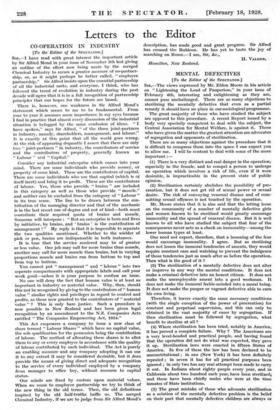Letters to the Editor
CO-OPERATION IN INDUSTRY [To the Editor of the SPECTATOR.] SIR,—I have read with great interest the important article by Sir Alfred Mond in your issue of November 5th last giving an outline of the effort now being made by the merged Chemical Industry to secure a greater measure of co-partner- ship, or, as it might perhaps be better called, " employee partnership." Sir Alfred insists upon the essential partnership of all the industrial units, and everyone, I think, who has followed the trend of evolution in industry during the past decade will agree that it is in a full recognition of partnership principles that our hopes for the future are based.
There is, however, one weakness in Sii Alfred Mond's statement which seems to me to be fundamental. From year to year it assumes more importance in my eyes because I find in practice that almost every discussion of the industrial situation is befogged by the same confusion of ideas. " I have spoken," says Sir Alfred, " of the three joint-partners in industry, namely, shareholders, management, and labour.' It is exactly at this point that all the world goes wrong. At the risk of appearing dogmatic I assert that there are only two " joint-partners " in industry, the contributors of service and the contributors of property, generally known as " Labour " and " Capital."
Consider any industrial enterprise which comes into your mind. There are some individuals who provide money, or property of some kind. These are the contributors of capital. There are some individuals who use that capital (which is of itself inert) and bring it to profit. These are the contributors of labour. Yes, those who provide " brains " are included in this category as well as those who provide " muscle." and neither can be excluded from the category of " Labour " in its true sense. The line to be drawn between the con- tribution of the managing director and that of the mechanic is in the last resort one of degree and not of kind—both must contribute their required quota of brains and muscle. Someone will interpose : " But an enterprise is born and lives by initiative, by brains, and ' brains' is the contribution of management ! " My reply is that it is impossible to separate the two qualities mentioned. Whether to the wielder of pick or pen, brains are indispensable in both instances.
It is true that the service rendered may be of greater or less value. One job may call for more brains than muscle, another may call for more muscle than brains, but in varying proportions muscle and brains run from bottom to top and from top to bottom.
You cannot put " management " and " labour " into two separate compartments with appropriate labels and call your work good—unless it is your purpose to confuse an issue.
No one will deny the fact that human value is at least as important in industry as material value. Why, then, should this not be recognized by giving to the contributors of " human value " similar rights and privileges in regard to control and profits, as those now granted to the contributors of " material Value " ? This is only bare justice. Such a procedure is now possible in New Zealand and has been given legal recognition by an amendment to the N.Z. Companies Acts entitled " The Companies Empowering Act, 1924."
This Act empowers a company to issue a new class of share termed " Labour Shares " which have no capital value, the sole qualification for the possession being the contribution of labour. The method of allocating these shares is to allot them to any or every employee in accordance with the quality of labour contributed by each individual. The Act is purely an enabling measure and any company adopting it can use it to any extent it may be considered desirable, but it does provide the means of giving direct and adequate recognition to the service of every individual employed by a company from manager to office boy, without recourse to capital status.
Our minds are fixed by custom upon material values.
When we come to employee partnership we try to think of the new thing, in the old terms. Then, the old definitions inspired by the old half-truths baffle us. The merged Chemical Industry, if we are to judge from Sir Alfred Mond's
description, has made good and great progress. Sir Alfred has crossed the Rubicon. He has yet to taste the joy of marching on Rome.—I am, Sir, &c., Hamilton, New Zealand.
H. VALDER.






































 Previous page
Previous page